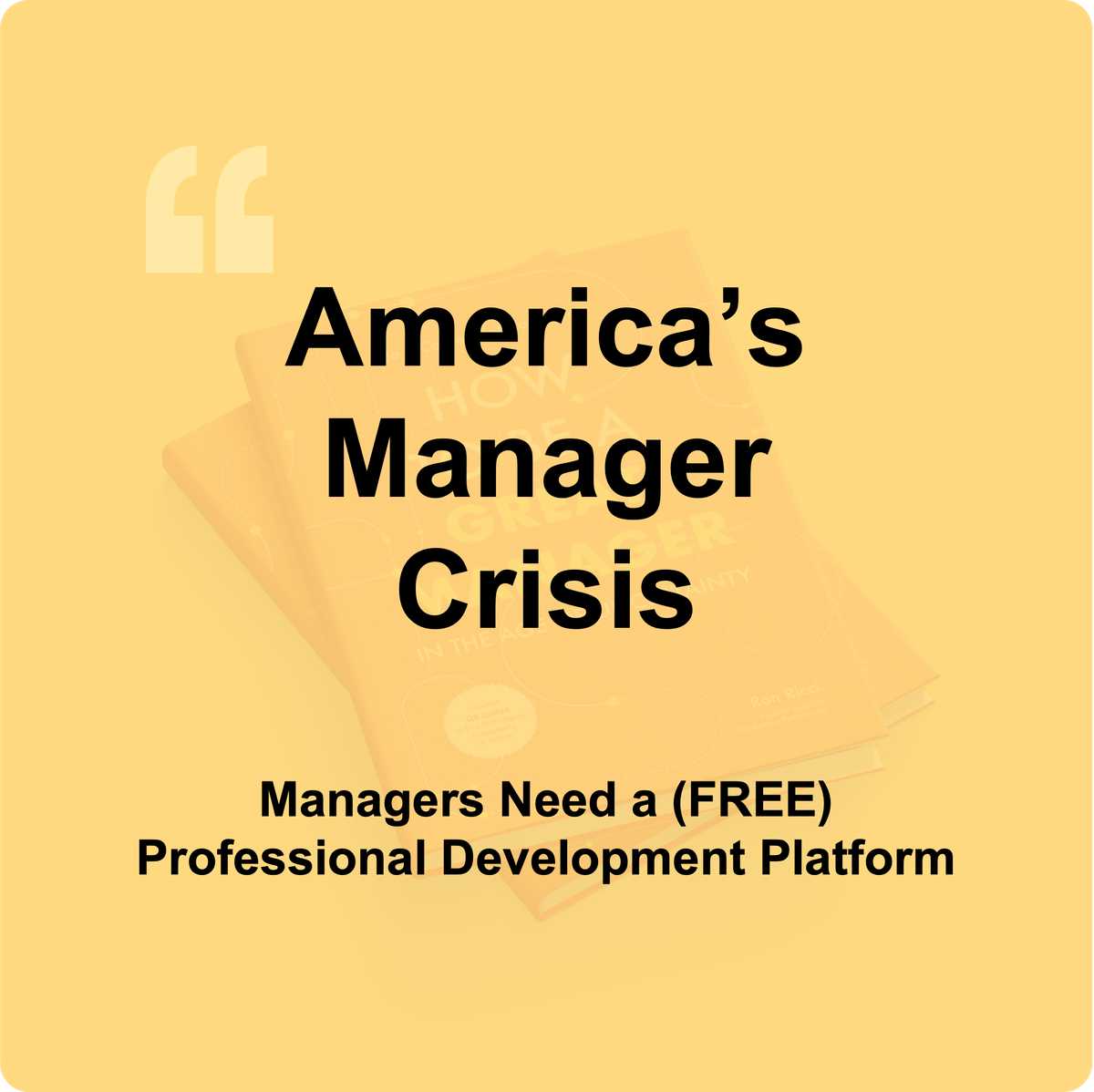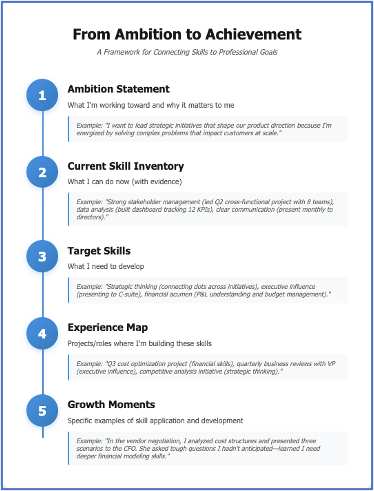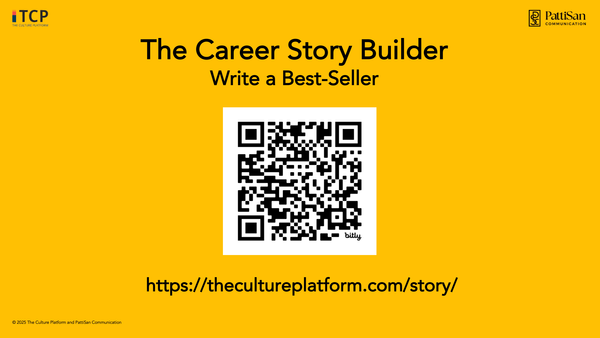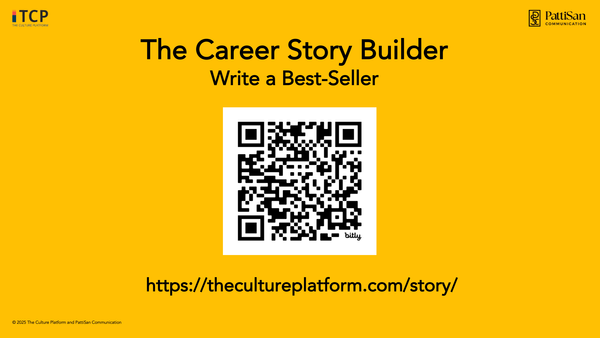America's Manager Crisis

"DEVELOPING MANAGERS HAS VAPORIZED."
When my friend and sales leader Tom Pridham told me this more than a year ago, he seemed to sum up the zeitgeist of managing in America.
Now that the facts are in. The state of support for managers in America is appalling. Development is now the exception, not the rule.
I can’t really believe it, because of how long I’ve managed and how many people I’ve managed in my career — when managers were rewarded for building great teams. But then again, I did most of my managing in the boomer era.
So, if you need some facts, here are the two that matter most:
- Less than half of all managers today get any formal training, according to Gallup’s 2025 “State of the Global Workforce” study.
- Managers only spend 13% of their time developing people, according to Deloitte’s 2025 “Global Human Capital Trends” study.
I can’t help but to think of what Oscar Munoz, retired CEO of United Airlines, and Stefani Okamoto from ServiceNow told me: Sometimes people become managers for the wrong reasons: money, ambition, politics. So the numbers are likely worse than we think.
Subscribed
First the Ladder, Now Development
Try to imagine being a top-performing millennial or gen-z right now. It’s one thing to know that the corporate ladder no longer exists to guide your career path; now we know it’s even more serious than we thought. It’s probable, based on the facts, that most managers don’t know how to develop or manage a top performer; and create the right opportunities to recognize and reward exceptional performance.
The future of managing is right here, right now, because the state of managing is in a clear crisis.
That’s why I’m devoting this issue of my newsletter to doing to something specific about the lack of professional development for managers. The best talent on the market knows they need to take charge of their careers themselves. If companies aren’t going to provide the resources to grow someone as a manager, it’s time someone did.
For readers of this newsletter, I’m making the How to be a Great Manager software tool available for free. The software maps to my book and this newsletter. Based on the research I’ve done, it’s the most up-to-date assessment on the market to measure what millennials and gen-z look for in a manager.
The software is designed as a “digital 360” — you self-assess yourself against the Six Drivers of Consistency, and compare yourself to peers, colleagues or teammates who also assess you. It includes verbatim statements (anonymized) that make a 360 so useful; but prepare yourself for some raw feedback.
Knowing the differences between self-perception and peer perception is the goal — so you can learn and take action specific to you as a manager. As the former COO of Cisco Rebecca Jacoby once told me: “Get perspective” if you want to be a better manager.
I want to empower all those managers out there with a digital platform for professional development. If you know an aspiring manager who is looking for feedback on their potential as a manager, forward this newsletter to them.
I’m also making 11 Kindle copies of my book How to be a Great Manager in the Age of Uncertainty available for free to the first 11 people who email me and request it. (Why 11? It’s my favorite number and it reminds me of my mom for some reason.)
Message Ron Ricci
How Consistent Are You?
The key to being a great manager today is understanding what Oscar Munoz described as “Knowledge of Contribution” — your strengths and weaknesses as a manager — in order to “Grow Yourself” as ServiceNow says.
The software helps managers find their strengths based on what it means to be consistent when managing teams, especially teams with millennials and gen-z.
Here are the Six Drivers and what self- and peer assessments in the software measure — and why those measures are important to managing in today’s age of uncertainty:
- Alignment
- What we measure: Is it easy or hard to align a job role to results that will be recognized and rewarded?
- Why it matters: Your people need to know today’s role can lead to future opportunities on the team, if expectations are exceeded.
- Accountability
- What we measure: Do you take responsibility for what you say and do?
- Why it matters: Contrary to popular thinking, your people want to own their work, but they can’t if you don’t.
- Consistency
- What we measure: Are you consistent?
- Why it matters: Your people want to know you are reliable.
- Facts
- What we measure: Are results measured with a common set of facts?
- Why it matters: Your people can only exceed expectations if they can communicate with data.
- Listening
- What we measure: How well are you listening to the team?
- Why it matters: Your people want you to know what’s working and what’s not. Two-way dialogue and communication is the answer. Your people are already talking among themselves. Tap into it.
- Mindset
- What we measure: Does your team know how you make decisions about people and budgets?
- Why it matters: Your people want to clearly know the rules of your road – because no two managers are exactly alike.
In the end, I think we should all be a little more upset over the shocking lack of support for managers today. After all, the future leaders of organizations all start out as managers. Bad habits beget worse habits. We can’t sweep it under the rug — the best people are counting on their managers to get ahead. Let’s get to work on developing managers today. Let’s act with urgency.
FREE Great Manager Software 360
Manager Thought of the Week
“Work for the best teacher you can find.”
I’m an optimist by nature, so when I hear something that I haven’t heard before that inspires me, I want to share it. My friend and former Speakeasy CEO Scott Weiss said this to me recently.
Scott speaks in a rapid-fire style sometimes; so here’s what he actually said when I asked him how to recognize a great manager:
“Look for a teacher.”
“Find a teacher.”
“Find the best teacher you can.”
“Work for the best teacher you can.”
“Try to work for three or four teachers in your career.”
He goes on to tell me that “teachers” are managers who take you under their wing and inspire behaviors based on what it really takes to be successful — humility, sharing success, telling the truth, taking responsibility, among others.
I ask him who was his best teacher/manager: Scott was in his twenties when he found himself in limousines going from airport to airport with the legendary Ted Turner. “He taught me about life,” Scott told me.
In Summary: Principles of Managing in the Age of Uncertainty
- I left Cisco to answer this question with research and evidence: What does the manager of the future look like? What are millennials and gen-z seeking in a manager? Which behaviors, tactics, skills or processes matter? What’s it going to take to attract and keep the best people over the next decade? In short, how to be a great manager.
- Based on this research, the core philosophy of this newsletter is rooted in one idea: successful managers in this moment in time, for this generation of talent, need to be “career dot-connectors.” The next-gen doesn’t expect to spend their entire career on your team — that’s an idea boomers grew up with. A job on your team is like a chapter in a career story to the current generation. If you want the best people on your team, you have to connect the dots between roles on the team and the career opportunities of the people working on the team.
- What is the“Age of Uncertainty”? If the industrial age was about taking predictable steps up the ladder, the age of uncertainty is about finding or discovering the path of a career without any predictable steps, without an obvious ladder — it’s why being a career dot-connector will differentiate you as a manager. People management is key.
- How to be a Great Manager in the Age of Uncertainty: Be a Career Dot Connector is available on Amazon. Learn to be great at people management.
- What kind of manager are you? Take my free self-assessment and learn about yourself. Learn how to be a great people manager.




